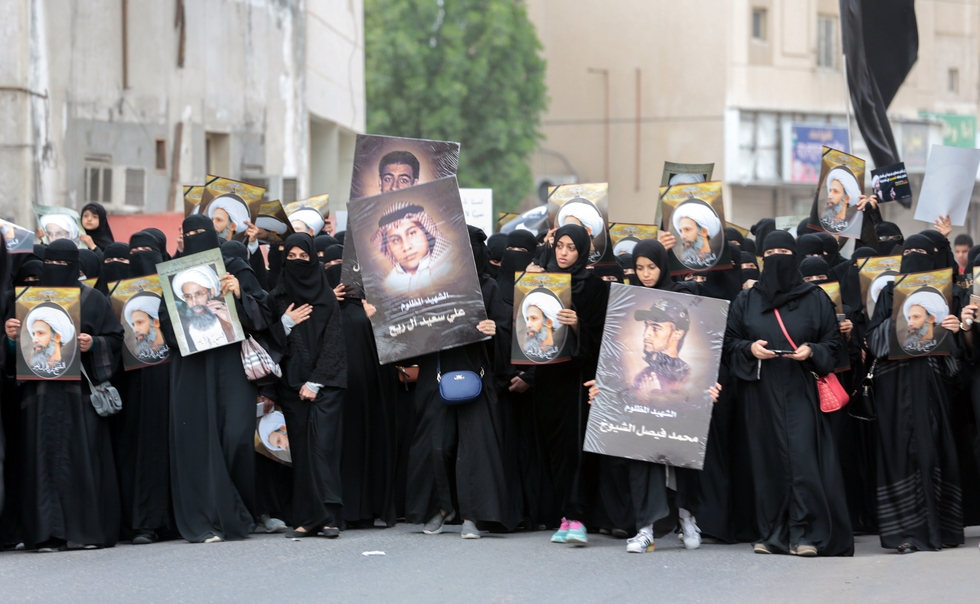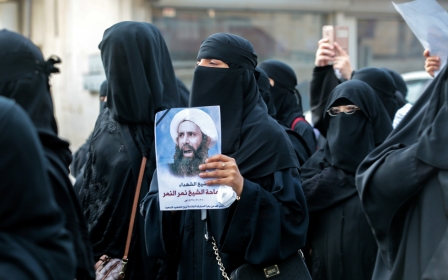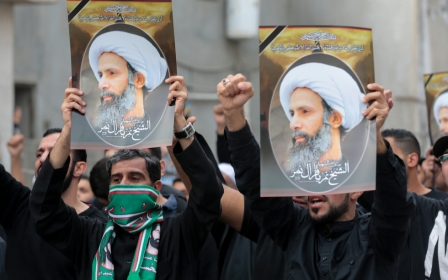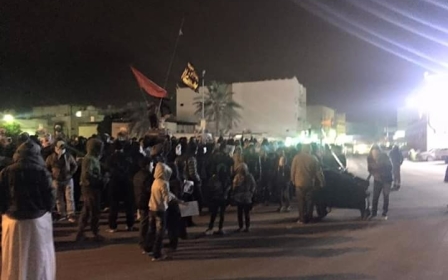Thousands march in Saudi Arabia to mark 40 days since cleric's execution

Social and religious committees in the eastern region of Saudi Arabia organised a protest in Qatif on Thursday night to mark 40 days since the execution of prominent Shia cleric Nimr al-Nimr at the hands of Saudi authorities.
According to eyewitnesses, a few thousand people marched from Revolution Street, calling for the downfall of the Saudi government.
Protests were also organised in the main square of Qudaih, a town in Qatif, with chants demanding an end of human right violations carried out by Saudi authorities.
Protesters also denounced what they described as the lack of justice that Nimr was subjected to, pointing to the fact that that he was not found guilty of charges held against him such as carrying arms at the time of his arrest.
Protesters, who chanted slogans against the Saudi regime, carried posters of those executed by Saudi Arabia. They also demanded the release of the rest of what they called prisoners of conscience, as well as an abolition of the death sentences issued against them.
In Nimr’s hometown of al-Awwamiya, a three-night vigil for the cleric is expected to take place at one of the local mosques beginning on Friday night. The vigil, according to local media, will include a special exhibition featuring photographs and some of Nimr's personal effects.
Translation: At the 40 day commemoration for Sheikh Nimr, the non-violent movement reiterates its values to defend the oppressed and fight despotism
Protests took also place in a number of Shia-populated countries in the Middle East.
In the Iranian capital of Tehran, protesters called for the exposure of the Saudi government policies and human rights violations. Religious leaders repeated their condemnation of Nimr’s execution.
In Iraq, a group of young clerics visited the Jawadain shrine in the Kathamiya district to pay homage to the cleric, in a show of solidarity.
The Islamic Action Movement in Bahrain, whose population is 70 percent Shia, issued a statement praising Nimr as a “righteous voice” that rattled the “depravity” of the Saudi royal family.
“They [Al Saud family] wanted to put an end to your life but you transcended them with your awareness and your words and worldly positions as a global martyr,” the statement read, addressing Nimr.
“As for your tyrannical murderers, God the avenger is watching them.”
Toby Matthiesen, a senior research fellow in Middle East affair at the University of Oxford said Qatif have felt "under siege" since the executions.
"The situation is very tense. After an attack on a bank in the greater Qatif area, the government stopped putting money into ATMs, so people are running out of cash. The area feels under siege," he said.
"Also, there is the uncertainty over whether the government will execute the other Shia, including minors, on death row."
He said there had been little response from the government so far, "but protests have not happened on this scale and with these harsh slogans for a while".
"In fact, the province was relatively quiet after the executions, probably because the community including Nimr’s family were calling for calm and were hoping that the bodies of the executed would be released.
"But now, after 40 days, there is little hope that this will happen, and it is customary for Shia to commemorate someone’s death 40 days after the death took place.
New MEE newsletter: Jerusalem Dispatch
Sign up to get the latest insights and analysis on Israel-Palestine, alongside Turkey Unpacked and other MEE newsletters
Middle East Eye delivers independent and unrivalled coverage and analysis of the Middle East, North Africa and beyond. To learn more about republishing this content and the associated fees, please fill out this form. More about MEE can be found here.




